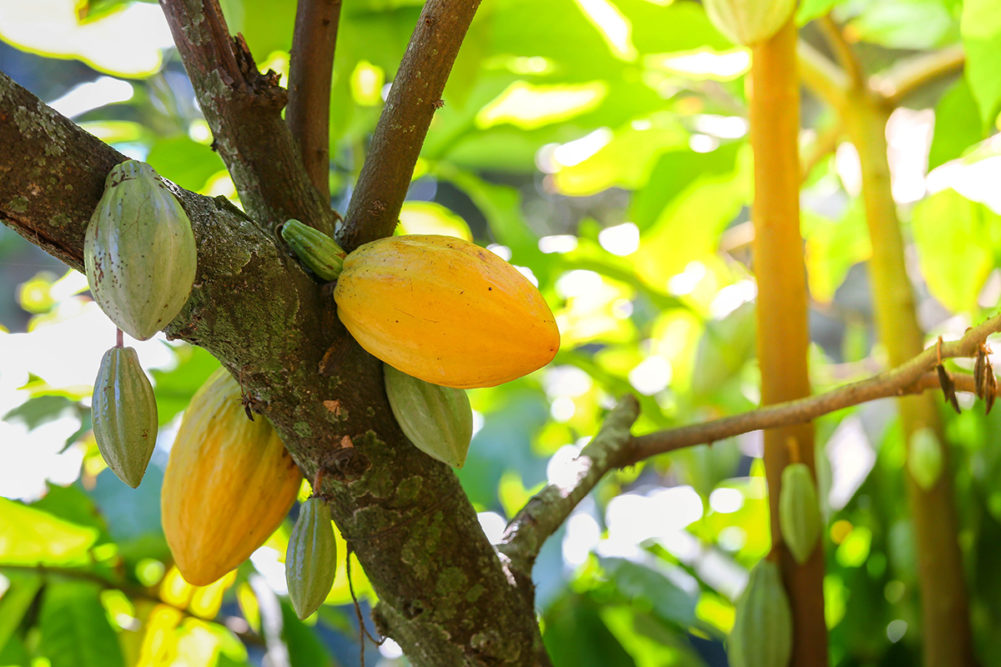The refreshing cacaofruit conquers the taste buds of consumers in new drinks and products. From chocolate to health drinks, three years after the introduction of this new food and drink category, consumers discover the cacaofruit. The delicious, zesty cacaofruit satisfies the need of millennials and Gen Z for food and drinks to be tasty and nutritious, as well as be good for the planet and its people.
By upcycling one of the most discarded fruits on the planet, the cacaofruit can be the most effective fruit to prevent global warming.
Cacaofruit is one of the most harvested, yet most discarded, fruits on the planet. If people don’t live close to the equator, usually they do not know what a cacaofruit looks or tastes like. That is about to change, since food manufacturers have managed to master the process of cultivating and preserving the fruit to turn it into delicious food and drinks in the US, and beyond.
Rise of the cacaofruit
One of the leading brands responsible for the rise of the cacaofruit in food and drinks is the global cacaofruit expert Cabosse Naturals, a Barry Callebaut brand. Worlds’ leading chocolate manufacturer turns every 5th cocoa bean into a delicious cocoa or chocolate manifestion.
In 2019, the Cabosse Naturals brand introduced a next generation of cacaofruit food and drinks by introducing a range of ingredients by making use of the entire cacaofruit, including its beans, peel as well as its fruity pulp and juice. The ingredients, with their fresh and fruity taste, are rich in nutrients such as fibres, protein and magnesium.
Consumer brands and artisans like to include the cacaofruit in their products to bring a new, fresh, fruity taste to their portfolio in juices, smoothies, frozen desserts, bakery, pastry products, snacks, all the way to chocolate.
Driving impact with upcycled cacaofruit
Annually about 14 million tons of cacaofruit are harvested around the world. Whereas previously 70% of the cacaofruit was thrown away (as much as 10 million tons), since only the seeds (beans) could be used to craft chocolate and cocoa creations. Now also the dried peel, and the fresh and juicy pulp are crafted into delicious ingredients.
The Upcycled Food Association, which mission is to prevent food waste, calculates that if all harvested cacaofruit was used to its fullest, it would reduce the same amount of CO2 as planting 3.5 billion trees per year. An area bigger than France and Germany combined.
According to Project Drawdown, the global leader in ranking climate solutions, preventing food waste is the single most effective solution to prevent global warming. Cacaofruit is the most impactful fruit to fully upcycle since 70% can be saved. To put it in perspective: overall about 30% of food and 50% of fruits and vegetables goes to waste.
Introductions in the US and beyond
Three years after the introduction of the next-gen fruit category, consumer and artisan brands in North America, the UK, Europe, and Asia-Pacific are introducing cacaofruit in beverages such as cocktails, mocktails, beers, energy drinks, health drinks, but also in ice-cream, snacks and chocolate.
In the US, one of the first brands to introduce the fruit in a consumer-facing product was Capao with cacaofruit snacks. Blue Stripes introduced a range of cacaofruit waters in Whole Foods Market, amongst others. BevCacao introduced a range of functional cacaofruit waters and Xoca, a cacaofruit probiotics drink.
Japan, known for its innovative taste culture, has cacaofruit ice cream from Minimal and Dandelion. and Godiva recently launched WholeFruit chocolate, along with their 100% pure cacaofruit juice.
In Europe and the UK cacaofruit waters are popping up such as Kokojoo and Pacha de Cacao. The brand Kayu takes it to the next level with an energy drink that includes the cacaofruit pulp. In Germany and the UK, a non-alcoholic cocktail base Kiukiu is on the market.
Last year, Ritter Sport and Lindt launched a 100% pure cacaofruit bar. In Belgium, land of the craft beers, Acan introduced a fresh, sweet-sour and fruity beer consisting of 80% beer and 20% cocoafruit juice, all available to purchase across borders.
Receiving praise for the ingredients and products
The cacaofruit ingredients of the global cacaofruit expert, Cabosse Naturals, received the “Sustainable Ingredient Award” at the 2021 Sustainable Food Awards for making a sustainable difference in terms of its environmental and/or social impact. They were also a finalist during the World Innovation Awards 2021 in the category Most Innovative Ingredient.
In 2022, the new type of chocolate WholeFruit, made possible by Cabosse Naturals, was introduced across the globe, by the pioneer in fine flavor cacao and chocolate since 1842, Cacao Barry.
This year they received the World Food Innovation Award for ‘Best Artisan Product’ for its strong proposition: tasty, good for the planet and its people. WholeFruit Chocolate also won Silver in the category New Sustainable Product Award at the Sustainable Food Awards.
Another innovation made possible with the cacaofruit is the first nutraceutical fruit drink Elix, made from 100% pure cacaofruit. Due to the high amount of preserved cacaofruit flavanols, the fruit drink has an EFSA health claim. Promoting circulatory health. Elix was a finalist at the 2022 World Food Innovation Awards in the category Best health or wellness drink.





